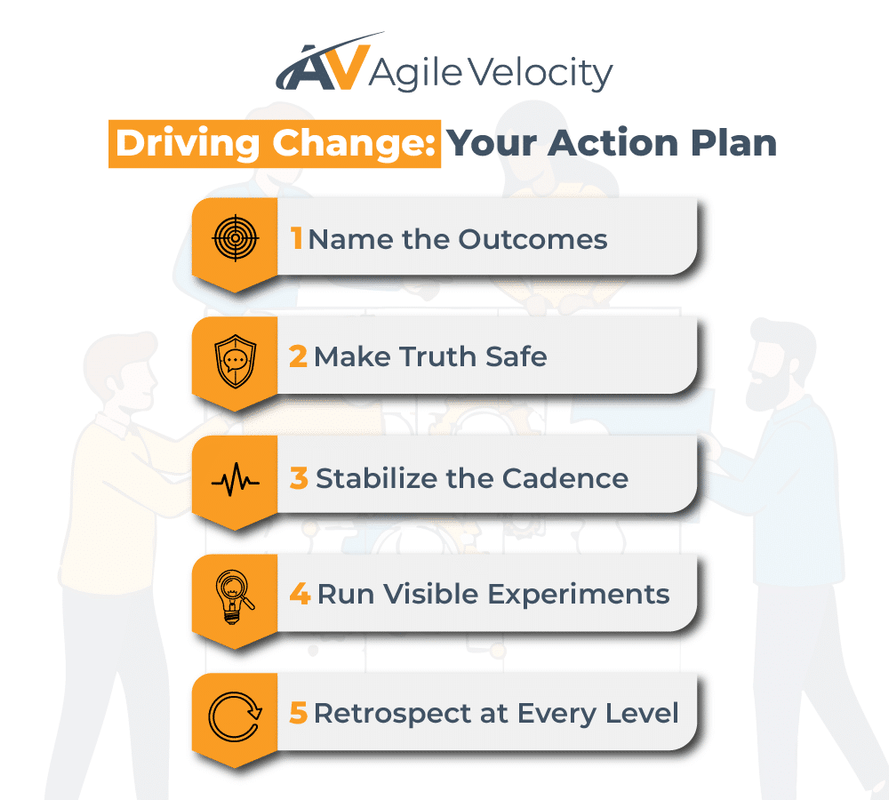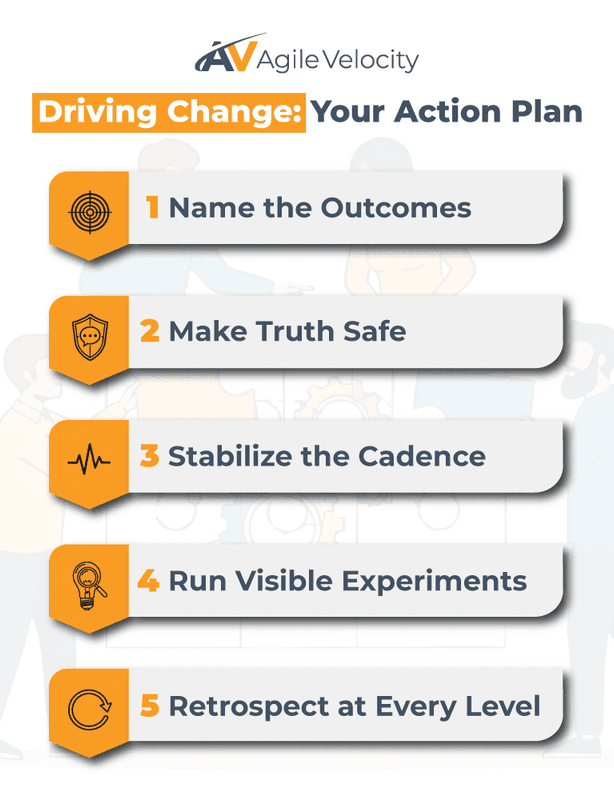Switching to Agile can unlock faster delivery, higher-quality outcomes, and the kind of agility businesses need to stay competitive. However, transitioning from traditional work practices to an Agile approach often feels overwhelming--not least because of the mindset and cultural shifts required. That's where an Agile Coach steps in.
An Agile Coach doesn't just teach processes--they guide teams, leaders, and entire organizations to adopt Agile in sustainable, practical ways. They help you overcome common challenges, align your goals, and create long-lasting improvements. They also encourage a new way of thinking, which focuses on collaboration and transparency at every level. This fresh mindset can be especially vital for large enterprises with multiple departments and layers of decision-making.
In fact, organizations like Southwest Airlines have witnessed how Agile Transformations, supported by expert coaching, can lead to tangible improvements. Whether it's reducing project lead times or creating more collaborative work environments, a well-guided Agile transformation has proven effective across various sectors. The bottom line: It's not just about implementing new processes--it's about ensuring teams genuinely embrace continuous improvement.
Below, we'll explore nine key benefits of bringing an Agile Coach on board. You'll see how they can support your team's journey, helping you navigate complex organizational structures, improve cross-functional collaboration, and accelerate meaningful results for your business.
Top 9 Advantages of Hiring an Agile Coach for Business Transformation
Adopting Agile has the potential to transform how you deliver value, enabling more adaptive processes and empowering teams to focus on real customer needs. Yet, many organizations encounter obstacles such as unclear priorities, resistance to change, and the challenge of discarding long-established work habits. Success often rests on shifting more than just systems--it requires reshaping leadership approaches and team dynamics from the ground up.
When you bring in an Agile Coach, you gain a trusted advisor who helps align people and processes. Their input ensures that Agile becomes a transformative way of working--rather than a set of rules followed once and forgotten. An experienced coach can also help you identify which Agile practices--such as Scrum, Kanban, or a combination of both--best fit your organization's context.
Below are some major benefits of leveraging an Agile Coach, from practical Scrum events and Kanban flows to larger-scale frameworks like Scaled Agile Framework® (SAFe®).


1. Understanding the Agile Transformation Journey
Embarking on an Agile Transformation is not just about new tools--it's a company-wide shift that touches strategy, structure, and culture. While you might start by implementing smaller initiatives, the ultimate challenge is sustaining momentum as you move away from rigid, traditional work models.
An Agile Coach helps clarify your long-term objectives, shaping a roadmap that addresses both executive-level strategy and day-to-day execution. They work closely with leadership to foster adaptive planning, enabling teams to handle real-time change without hesitation. By guiding organizations to iterate on their priorities and continuously adapt, an Agile Coach helps make agility a permanent part of how you operate.
This journey-centered approach also ensures you don't get stuck with half-adopted frameworks or incomplete rollouts. Instead, your coach promotes a systematic shift toward iterative thinking in product delivery, portfolio management, and even budgeting. This cohesive methodology makes continuous adaptation part of your organization's DNA.
2. Facilitating a Smooth Transition to Agile
Transitioning to Agile does more than add a fresh checklist--it reframes how your entire business delivers value. Perhaps your teams are introducing timeboxed Sprint Planning or Daily Scrum events to maintain focus. Regardless of the specific method or framework, the real shift lies in altering day-to-day behaviors and changing how people collaborate.
An Agile Coach tailors these practices to your organizational environment. For instance, they'll show teams how to break down large projects into smaller, manageable increments, with clear Sprint Goals and frequent check-ins. They also help leaders recognize why fostering communication and trust is as important as hitting release dates. The coach's role is to ensure the new processes not only align with your organization's goals but also resonate with team members--so the momentum can last well beyond a pilot phase.
For broader initiatives, where frameworks like SAFe become relevant, an Agile Coach helps maintain a cohesive strategy. Rather than letting teams operate in silos, the coach aligns activities under a unifying Agile mindset, promoting transparency across all departments. This structured transition paves the way for deeper cultural changes that deliver lasting benefits.
3. Overcoming Common Challenges During Agile Transformation
Agile is designed to increase adaptability, but organizations sometimes run into familiar pitfalls. Silos can form when teams concentrate only on their immediate tasks, losing sight of broader goals. Leaders might struggle with how to measure progress in iterative cycles, and cross-functional collaboration might be stifled by outdated hierarchies.
An experienced Agile Coach spots these snares early and works to dismantle them. They translate Agile jargon into workable plans, ensuring that whether you're using Scrum or Kanban, each activity flows back to higher-level objectives. This alignment reduces confusion and fosters more unified efforts among all stakeholders.
When difficulties arise--like pushback on new processes or challenges consolidating backlogs across departments--the Agile Coach helps you navigate them. By focusing on transparency, adaptability, and iterative gains, your organization can track progress without losing sight of the larger mission.
4. Fostering Organizational Agility and Collaboration
One hallmark of a thriving Agile Transformation is a culture of collaboration. Silos and inconsistent priorities can undercut the value of short cycles or carefully planned Sprints. To unlock the full benefits of Agile, teams, Product Owners, and leaders must center efforts on shared objectives.
An Agile Coach actively works to break down these barriers. By facilitating inclusive events--like Sprint Retrospectives, Sprint Reviews sessions, or broader planning meetings--they help align the organization. The coach also encourages enhanced cross-team communication, emphasizing a collaborative mindset that is crucial for adapting to new challenges in today's dynamic work environments.
Coaches often leverage Lean Portfolio Management to ensure strategic alignment and manage Work In Progress (WIP) Limits. This approach nudges teams to concentrate on the most valuable tasks first, creating quick wins that build morale and confidence. Over time, your organization learns how to collaborate more freely, reducing bottlenecks and working toward common results.
5. Empowering Continuous Improvement for Long-Term Success
At the heart of Agile is a commitment to continuous improvement. Rather than waiting for a project to finish to analyze lessons learned, Agile encourages teams to reflect frequently on what's working--and what isn't. This iterative thinking helps you pivot quickly, preventing small problems from becoming major setbacks.
An Agile Coach instills this mindset by championing retrospectives, data-driven discussions, and experimentation. They encourage leadership to rely on real-time feedback and metrics rather than intuition alone. As teams practice rapid learning cycles--planning, doing, reflecting, and revising--they become more comfortable taking initiative and adapting on the fly.
Using tools like Path to Agility® Navigator, teams can visualize their transformation journey in real time and track their progress towards new behaviors. Over weeks and months, continuous improvement becomes second nature, fueling an environment where every iteration refines your approach, adds greater value, and keeps the organization nimble in evolving markets.
Request a Demo
Discover Path to Agility® Navigator, a top continuous improvement software for organizations striving to deliver value more efficiently.
6. Accelerating Business Value Delivery
Delivering value more quickly is a top priority for most organizations exploring Agile. By organizing shorter work cycles--and refining them through Sprint Planning and Sprint Retrospectives--teams can respond promptly to user or stakeholder feedback. Instead of waiting months for a single large release, deliverables come in smaller increments that can be tested and adjusted on the fly.
An Agile Coach provides the structure and expertise to tie these efforts to your overarching strategic objectives. That might involve using Lean Portfolio Management to ensure leaders have a realistic view of capacity and can prioritize features with the highest return on investment. With each Sprint or Iteration, your organization strengthens its ability to align measures of value with real-world user demand.
7. Strengthening Leadership Decision-Making
Traditional leadership models often rely on multiple layers of review, which can slow decisions and inhibit responsiveness. When organizations adopt Agile practices, leaders begin to seek more immediate, data-driven insights that better reflect current realities.
Agile Coaches help leadership teams redefine success metrics and guide adaptive planning. System demos and sprint-based reviews offer fast feedback loops for executives, allowing them to see the direct impact of each iteration. Over time, leaders build confidence in iterative planning and learn to pivot swiftly in response to new data. This collaborative decision-making style empowers all levels of the organization, minimizes bottlenecks, and enhances team ownership.
8. Streamlining Agile Practices Across Departments
Agile is more than a development or IT framework. Embracing Agile across finance, marketing, operations, and beyond can unlock a holistic transformation. An Agile Coach helps each department adapt methods like Kanban or key Scrum events, weaving iterative thinking throughout the entire organization.
For example, financial teams might discover innovative ways to manage budgeting and forecasting in shorter cycles. Marketing teams can run campaigns in iterative phases, gathering customer feedback sooner. Operations may use visual Kanban Boards and WIP Limits to enhance transparency. By connecting these diverse efforts, an Agile Coach ensures that every department aligns with common objectives.
9. Building a Self-Sufficient, Agile Organization
Ultimately, the goal of hiring an Agile Coach is to foster a culture where teams can operate independently without needing ongoing external support. As employees learn to facilitate Daily Scrum events, manage iterations effectively, and leverage metrics for insight, they become more autonomous and resilient.
This self-sufficiency spans the organization. Scrum Masters promote collective ownership within Scrum Teams, bolstering direct communication and mutual accountability. Product Owners balance shifting priorities to ensure every cycle tackles the most valuable work. Over time, agility becomes embedded in the organization's operating principles.
Moreover, Agile coaching supports the development of a cross-functional mindset that prepares organizations to navigate a variety of challenges--whether adapting to new working arrangements or integrating innovative digital solutions. As teams grow more comfortable with new methods, they can confidently handle emerging shifts, integrating fresh practices within their established Agile frameworks.
Your Next Steps Toward Lasting Agility

When you're ready to embrace agility, enhance collaboration, and deliver higher-value outcomes, the guidance of an Agile Coach can be the catalyst you need. Backed by practical experience and proven strategies, these coaches help steer your organization through the everyday realities of Agile transformation--ensuring that new practices are not only adopted but become ingrained in your culture.
If you'd like to learn more about how coaching, training, or other services can accelerate your Agile journey, contact Agile Velocity today to explore our approach and schedule a consultation. Together, we'll outline a roadmap for sustained success--helping your teams become more adaptive, innovative, and ready for whatever the future brings.
Is Your Organization Truly Ready?
Download the "Are You Ready for an Agile Transformation?" white paper to uncover the 7 crucial questions that will assist in assessing your organization's preparedness for embarking on the journey.



